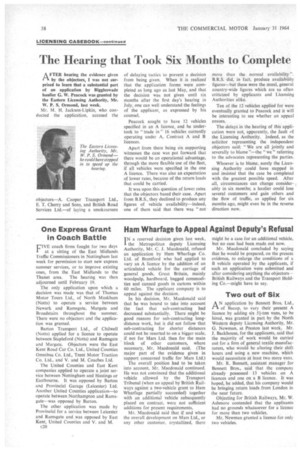Ham Wharfage to Appeal Against Deputy's Refusal
Page 40

If you've noticed an error in this article please click here to report it so we can fix it.
IN a reserved decision given last week, I the Metropolitan deputy Licensing Authority, Mr. C. J. Macdonald, refused an application by Ham Wharfage Co. Ltd. of Brentford who had applied to vary an A licence by the addition of an articulated vehicle for the carriage of general goods, Great Britain, mainly woodpulp, hardboard, bagged commodities and canned goods in cartons within 60 miles. The applicant company is to appeal against the decision.
In his decision, Mr. Macdonald said that he was bound to take into account the fact that sub-contracting had decreased substantially. There might be good reasons for sub-contracting Tongdistance work, but it did not follow that sub-contracting for shorter distances could not be resorted to on a bigger scale, if not for Mars Ltd. then for the main block of other customers, where necessary, Mr. Macdonald said. (The major part of the evidence given in support concerned traffic for Mars Ltd.) The overall position had to be taken into account, Mr. Macdonald continued. He was not convinced that the additional vehicle allowed by the Transport Tribunal (when an appeal by British Railways against a two-vehicle grant to Ham Wharfage partially succeeded) together with an additional vehicle subsequently placed on contract, were not sufficient additions for present requirements.
Mr. Macdonald said that if and when the overall development on Mars Ltd., or any other customer, crystallized, there might be a case for an additional vehicle, but no case had been made out now.
Mr. Macdonald concluded by saying that he would be prepared, on the present evidence, to enlarge the conditions of a B vehicle operated by the applicants, if such an application were submitted and after considering anything the objectors— British Railways and the Transport Holding Co.—might have to say.
Two out of Six
AN application by Bennett Bros. Ltd., of Bacot), to vary their present A licence by adding six 53:-ton vans, to be hired, was granted in part by the North Western deputy Licensing Authority, Mr. G. Newman, at Preston last week. Mr. J. Backhouse, for the applicants, said that the majority of work would be carried out for a firm of general textile manufacturers, who would be altering their shift hours and using a new machine, which would necessitate at least two more vans.
Mr. R. Bennett, assistant manager for Bennett Bros., said that the company already possessed 13 vehicles on A Licences and one on a B licence. It was hoped, he added, that his company would be bringing return loads from London in the near future.
Objecting for British Railways, Mr. W. Ashmore contended that the applicants had no grounds whatsoever for a licence for more than two vehicles.
Mr. Newman granted a licence for only two vehicles.




















































































































